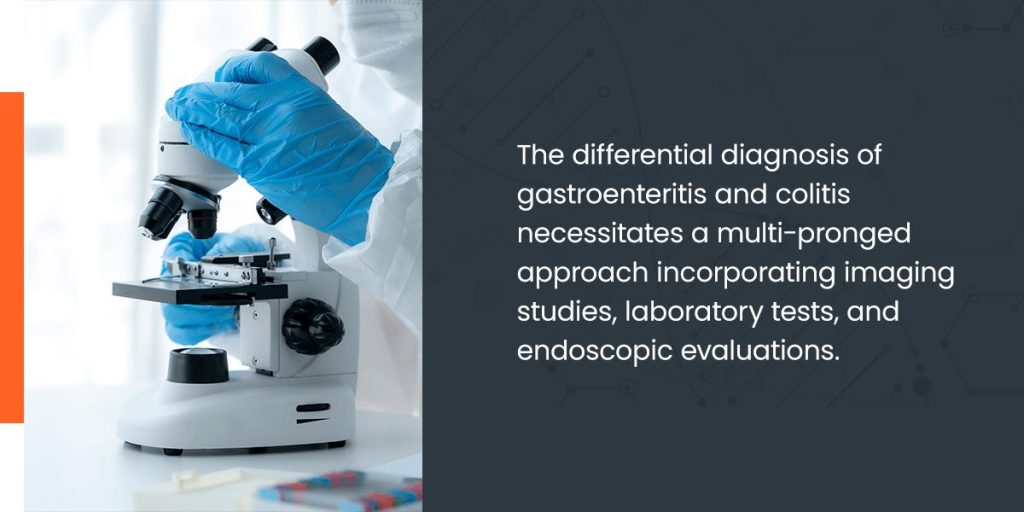Gastroenteritis and colitis are prevalent gastrointestinal (GI) pathologies that share symptomatic overlap, including diarrhea, nausea, and abdominal discomfort. For effective therapeutic measures to be implemented, correct diagnosis is essential. However, differential diagnosis can prove challenging due to the multitude of pathogens capable of inducing these conditions and the symptomatological similarity between the two.
Learn more about the distinguishing features of gastroenteritis and colitis and the tools to reach a prompt and accurate diagnosis.
What Is Gastroenteritis?
Often referred to as the stomach flu, gastroenteritis primarily originates from a viral, bacterial, or parasitic infection. While norovirus is a common culprit, other viruses, such as rotavirus, adenovirus, and astrovirus, can also give rise to gastroenteritis. The symptoms, transmission and treatment of this infection are:
- Symptoms: Gastroenteritis is characterized by inflammation of the gastrointestinal tract, which includes the stomach and intestines. The most common clinical signs of gastroenteritis include nausea, emesis, diarrhea, abdominal pain, and sometimes pyrexia. The severity and duration of these symptoms can vary significantly.
- Etiology: Gastroenteritis is mainly transmitted through contaminated food or water or direct contact with an infected person. Poor hygiene practices can exacerbate the spread of the disease. The mortality risk from gastroenteritis is higher among infants, older adults, and immunocompromised individuals.
- Treatment: Management of gastroenteritis involves rest, hydration, and over-the-counter medications to alleviate symptoms. Medical intervention might be necessary in severe cases.
What Is Colitis?
Colitis is an infection that specifically targets the colon, leading to inflammation. This disease entity encompasses multiple subtypes, including ulcerative colitis, Crohn’s disease, and infectious colitis. Clinical manifestations, causes, and treatment methodologies include:
- Symptoms: Colitis can have varying symptoms depending on the subtype and severity of the condition, but symptoms generally manifest as abdominal pain, diarrhea, hematochezia, fatigue, and weight loss.
- Etiology: The etiology of colitis is multifactorial. Researchers believe an abnormal immune response causes ulcerative colitis and Crohn’s disease, while a bacterial or viral infection causes infectious colitis. Other potential causes include genetics, environmental factors, and certain medications.
- Treatment: Treatment for colitis typically involves a combination of medication, dietary changes, and lifestyle modifications. Severe cases can necessitate surgical intervention. Early diagnosis and treatment are the keys to helping prevent complications and improve patient outcomes.
Gastroenteritis and Colitis Testing Guidelines
The differential diagnosis of gastroenteritis and colitis necessitates a multi-pronged approach incorporating imaging studies, laboratory tests, and endoscopic evaluations.

Gastroenteritis Testing
Laboratory testing for gastroenteritis usually involves stool cultures to identify pathogenic etiology and blood tests to check for infection or inflammation. Abdominal X-rays or CT scans are imaging studies healthcare personnel might use to evaluate the extent of damage or inflammation in the GI tract from gastroenteritis.
Colitis Testing
To diagnose colitis, a healthcare professional can use laboratory tests like stool cultures, blood panels, and fecal calprotectin tests to check for inflammation in the colon. In some cases, an endoscopic procedure may be necessary for proper diagnosis. Procedures such as colonoscopies or flexible sigmoidoscopies provide direct visualization of the colon and allow tissue sampling if a histopathological evaluation is needed.
Gastroenteritis and Colitis Testing Challenges
Traditional stool testing, while useful, has several inherent limitations that can compromise the accuracy and reliability of results:
- It’s time-consuming: One of the main challenges of traditional stool testing is that it can take several days to produce results. As early diagnosis and treatment are crucial to preventing complications and improving outcomes, this delay may pose a problem.
- It can be unreliable: Traditional stool testing can be unreliable or inconsistent. It might not always detect the presence of specific pathogens or bacteria that can cause gastroenteritis or colitis. This can lead to false negative results — delaying appropriate treatment.
- It offers an incomplete picture: Standard stool testing may fail to comprehensively represent the extent and severity of inflammation, which can complicate treatment decisions.
To overcome these challenges, medical professionals may use alternative testing methods, such as PCR or multiplex testing, which can provide faster and more accurate results. These tests can also detect a broader range of pathogens and bacteria, allowing for more precise diagnosis and treatment.
Outcomes of Incorrectly Diagnosing Gastroenteritis and Colitis
Misdiagnosis can have serious consequences for patients, including delaying treatment and worsening underlying pathology. Misinterpreting colitis as gastroenteritis, or vice versa, can lead to:
- Inappropriate treatment plans.
- Escalation of healthcare costs.
- Unnecessary testing and medication.
- Potential drug-related side effects.
Ultimately, a misdiagnosis lengthens the disease course, adversely impacting the patient’s quality of life and daily functioning.
Gastrointestinal Pathogen Panel for Gastroenteritis and Colitis
Applied Biocode’s gastrointestinal pathogen panel is a cutting-edge diagnostic tool that uses multiplex PCR technology to detect many pathogens and bacteria that can cause gastroenteritis, colitis, and other gastrointestinal infections. This advanced testing approach offers several benefits over traditional stool testing:
- It casts a wide net: The gastrointestinal pathogen panel can identify several infection-causing pathogens simultaneously, including viruses, bacteria, and parasites. Overall, it allows for a more accurate and comprehensive diagnosis of gastrointestinal conditions, which can lead to more effective treatment and management.
- It delivers results fast: The panel delivers results much quicker than traditional stool testing methods, with answers available in as little as 24 hours, allowing for early diagnosis and treatment. The gastrointestinal pathogen panel can help patients avoid complications and experience better outcomes.
- It’s exceptionally sensitive: The GI panel is highly sensitive and specific, meaning it can detect even small amounts of pathogens in a patient’s stool sample. This can help reduce the risk of false-negative results and ensure patients receive the proper treatment for their condition.
Overall, the GI pathogen panel offers a fast, accurate, and comprehensive approach to diagnosing gastroenteritis, colitis, and other GI infections. It’s a dynamic tool for healthcare providers to diagnose and manage these conditions.
Identify Gastrointestinal Pathogens for Gastroenteritis and Colitis With Applied BioCode Inc.
Applied Biocode Inc. is a biotechnology company specializing in developing and manufacturing molecular diagnostic tests that detect infectious diseases and other conditions. Our innovative products use advanced multiplex PCR technology to identify various disease-causing pathogens, including those difficult to diagnose using traditional methods.
We design our products for speed, accuracy, and ease of use to help you improve the health of your patients. Contact Applied Biocode Inc. today to start using our gastrointestinal pathogen panel to diagnose IBS or stomach virus quickly and accurately.



